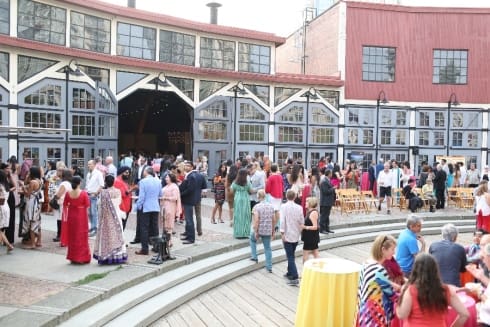Vancouver’s Indian Summer Festival is now in its sixth year. Co-founder Laura Byspalko told us about its background and unmissable events, including a performance by musicians Rajasthan Josh, a talk by activist Vandana Shiva, and the opening gala, catered by Vikram Vij and chefs from Ancora, Blue Water Cafe, Cafe Medina and more. —Aileen Lalor
Why did you decide to set up the Indian Summer Festival in 2011?
The initial idea came from the fact that 2011 was the Year of India in Canada. We thought that Vancouver can be really segregating. It’s the gateway to Asia and is so diverse, but we all need encouragement to get out of our little pockets and start talking. We like to think of the Indian Summer Festival as a model for what life should be—diverse, inclusive, culturally mixed conversations between people. It’s not exclusively for South Asian people. It’s a festival for curious minds—anyone who wants to be part of the global citizenship conversation.
How have you managed to make the festival survive and thrive over the years?
We were hungry right from the start, and we worked hard. A few early adopters convinced us that it was worth all the blood sweat and tears. We also had champions and ambassadors like Vikram Vij. Vancouver is literally at the other end of the world from India, but luckily it’s beautiful in the summer so it’s not difficult to persuade people to travel. It started as a smallish festival in one venue, and this year we’re hoping to impact 50,000 people across eight venues. The variety of venues means the festival is a way for Vancouverites to get to know their own city.
Where does your interest in Indian culture stem from?
At a young age, I was curious about the world—I had travelled to around 30 countries before I reached India. It’s incredible and baffling —everything is possible.
Explain this year’s theme, Border Crossings
Right now, we’re all aware of this issue of crossing physical borders. Our events will also cover psychological and sexual borders. Our opening gala is a foodie event curated by Vikram Vij, who was born in India, trained in Austria and lives in Canada and brings all those cultures to his food. He’ll be working with chefs from restaurants like Ancora, which is Peruvian—Japanese, and Medina, which is Mediterranean—Turkish. The audience is foodies—it’s nothing to do with ethnicity. Something Vikram says that I love is that people’s first foray into ‘the other’ is often through their stomachs. Then there’s Seeding the Future, a talk by environmental activist Vandana Shiva. Her message is global, and her audience will be people who are interested in the environment—again, nothing to do with cultural heritage.
What’s the one event this year that sums up what the festival is about?
Songs of the Desert Sufis, the performance by Rajasthan Josh. They’re musicians that have collaborated with Mick Jagger, Radiohead, Israeli musical groups, without losing their own deep cultural roots. That’s the epitome of what we want to do—promote the idea that you can be comfortable with yourself but have conversations with others who don’t necessarily look at things the same way as you.
Which will be most thought-provoking?
Dangerous Silences, a conversation between filmmakers Deepa Mehta and Leslee Udwin. Leslee is based in London and made a documentary film about the gang rape that happened in Delhi four years ago. There’s also Maple Leaf Islam, in which we’ll be talking about the place of religion in secular society. 5×15 is always a popular event for us. These are unscripted speeches where five speakers have 15 minutes each to speak about something they’re passionate about—anything from Chilean revolutionaries to what makes someone good or evil. The festival is about celebrating India, but also having tough conversations in a respectful way.
What are your favourite moments from past festivals?
In 2011, there was the conversation between Canadian writer Yann Martel, author of Life of Pi, and Bollywood actress Tabu, who featured in the movie adaptation. They had never met before and the event made connections between India and Canada, arts and film, placing different people who would never usually find themselves on stage, having a chat. Rajasthan Josh performed three years ago with Sarah Fitzpatrick of Delhi to Dublin and it was very special to see them jamming and having a beautiful conversation without language. Last year, we held a concert at the Orpheum with a group of Indian classical musicians including Ustad Amjad Ali Khan, performing with Jeanette Bernal-Singh, a Mexican-born VSO violinist. The Indian musicians played without sheet music, as is traditional, but had written it out for her. There was a moment when Jeanette looked at the other musicians and left the page. That brought goose bumps and reminded me that all the hard work is worth it.




Be the first to comment